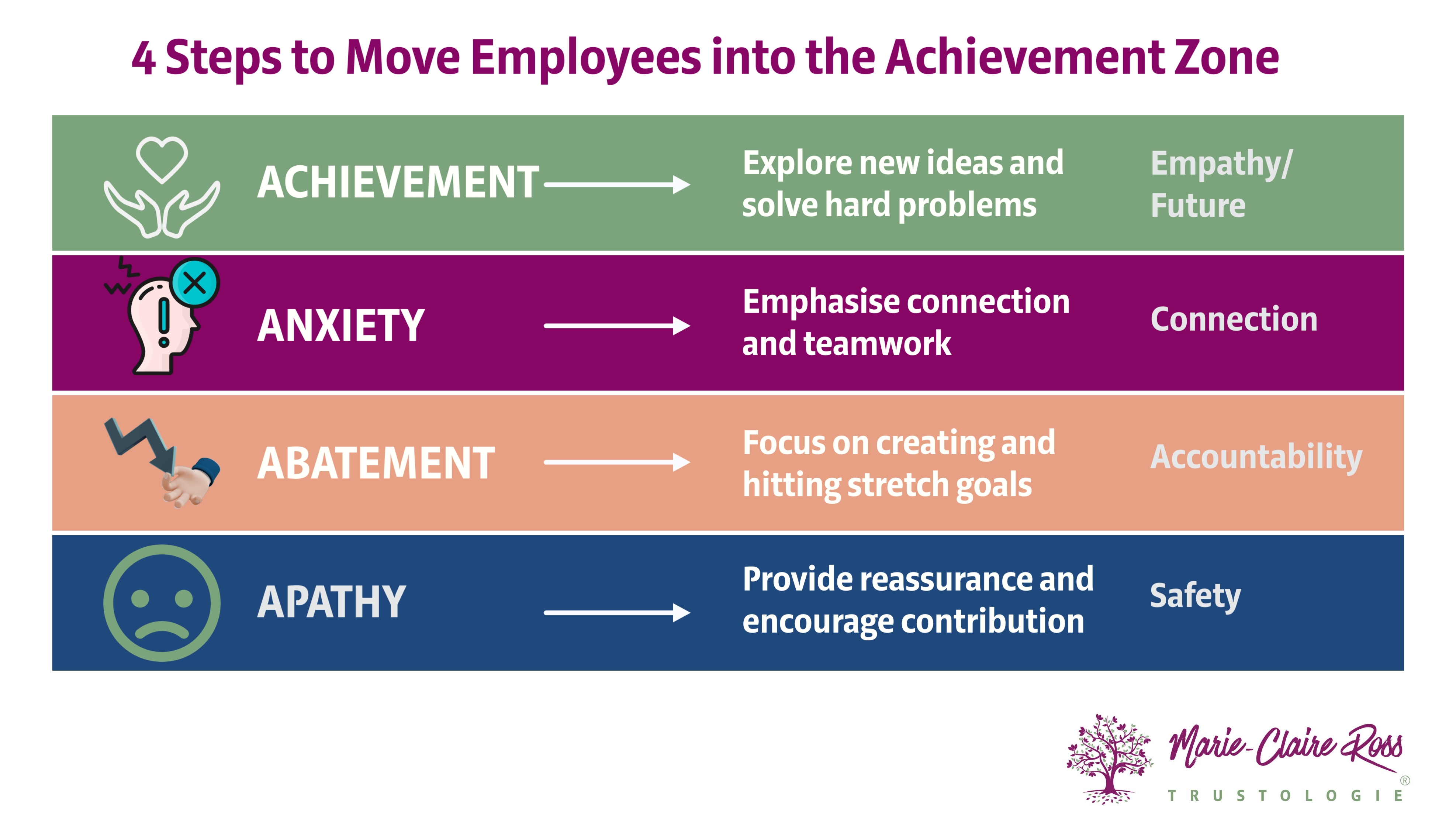11 min read
4 Practical Strategies for Better Emotional Management in the Workplace
I have a friend who often finds herself at the mercy of her emotions. Recently, she called me to rehash a confrontation she’d had with a group of...
Develop leaders, strengthen executive teams and gain deep insights with assessments designed to accelerate trust and performance.

Transform how your leaders think and perform with keynotes that spark connection, trust and high-performance cultures.

Explore practical tools, thought-leadership and resources to help you build trusted, high-performing teams.

Trustologie® is a leadership development consultancy founded by Marie-Claire Ross, specialising in helping executives and managers build high-trust, high-performing teams.

11 min read
Marie-Claire Ross : Updated on January 25, 2026

Table of Contents
One of the issues I always consider when CEOs come to me about improving trust in their leadership team is whether they have a sociopath in their midst. Over the years I've seen countless leadership teams have difficulties because either one or more team members is a sociopath. This even can include the CEO themselves.
Sociopaths are Individuals who are superficial, impulsive, irresponsible, grandiose and who function with little or no conscience. You can also bundle in narcissists as well. The main difference is that sociopaths derive pleasure from hurting others, while narcissists only harm people out of self-interest. It's just a side-effect you could say, but it's not their intention to harm (although, it doesn't feel like that when you are on the receiving end).
In the book the Sociopath Next Door, research has found sociopaths to be rare in society comprising only 1 per cent of females and 3 per cent of males. If you add in narcissists and psychopaths, the estimate is around 15% of the population. While they may appear few in number, their behaviours are far-reaching.
In this article, to make it easier to understand I will refer to them all as sociopaths or narcissists. Of course, it's hard to know without a diagnosis, but what I have learnt over the years is that they are all dysfunctional. No matter how much you train or coach them they will never be team players and care about others. They will never be a trusted leader. Putting them in charge of other people is a recipe for creating a toxic culture.
I never make the decision lightly to consider someone as possibly being a sociopath. There are a range of things that I like to observe and question in stakeholder interviews - with those who work with them and even with them. The more evidence I hear independently from other sources, the more I know my suspicions are correct. I usually keep these findings to myself, unless I am asked (I always provide tools for other leaders to circumvent negative behaviours). However, I will not coach them. They are uncoachable.
One of the interesting things about sociopaths is that when they hurt others, most people respond with "I can't believe they could do that to me." I hear this a lot in workplaces, so I want to share with the eleven warning signs that I look out for:
Sociopaths love the symbols of money and power. They tend to live in the best suburbs, drive expensive cars or send their kids to private schools. Everything is about status and achievement. They look down on those who "don't work hard enough" or "who aren't smart enough to make lots of money." They love designer brands, overseas holidays and tend to spend a lot of money on beauty treatments (even men).
This relentless drive for dominance naturally propels them into positions of authority. You will find them where power is concentrated - in corner offices, at the lecterns of prestigious universities, in the upper echelons of medicine and law, and even in the pulpit. Not surprisingly, they are very common in leadership teams.
To identify this personality type, look past the polished resume and observe their "downward" interactions. The way a leader treats those with less power -such as junior staff or restaurant servers - is the ultimate reveal. While an effective leader views their team as partners to be developed, the narcissistic leader views them as tools to be used.
Reports often describe these leaders as unsupportive or "extractive." They will bury their staff under crushing workloads without a word of thanks, because they don't see the effort - only the output that fuels their own reputation.
Sociopaths are master manipulators diverting attention from their disturbing character traits with their superficial charm. Flattery enables them to quickly bond with another person. Sociopaths are incapable of love and connecting emotionally with others. Instead, they see people as objects that can be manipulated for their entertainment.
In a workplace, they look for any evidence they can use against others which they can leverage for their own advantage. You never want to share your secrets with them as they will use them against you. They will also pit people against one another and complain about others a lot. Be wary of any colleagues who will tell you something bad someone allegedly said about you. This is a tactic sociopaths use to create chaos and destroy those they find a threat.
They also lie a lot. It's what often makes them appear fake because they will pretend to like things they don't, so they fit it. There is always a big gap between their words and actions. In a stakeholder interview, an employee told me about her previous toxic boss had told her said she was a wonderful teacher. The employee said "She never saw me teach in the classroom. How would she know I am good? It was just so inauthentic."
A telltale sign of a sociopath is that they are incredibly lazy. They will work 9-5, handball work onto others and do the bare minimum.
While a sociopath will commonly work hard to gain access to a high-powered job, they do it strategically so they don't have to work too hard. You will often find they cheat and lie their way to success (or find a spouse who has money and connections).
A leadership team I worked with had a senior leader who was most probably a sociopath. The team were all working incredibly hard - every single one worked evenings and weekends. Except the sociopath. He ended up going on annual leave without much notice, leaving a mess for his colleagues that added to their already heavy workloads. A sociopath has no guilt or care over burdening others.
One of the most common signs of a sociopath in the workplace is that they talk a lot about themselves and are keen to big-note their achievements.
They will always take credit for the work of their team and will quite regularly talk about what they did that was really great (even when it was average!).
I have a bit of a spidey sense with sociopaths. When I sit down and have a coffee with them, I get really, really exhausted (which is unlike me, as an extrovert who gets energised by people). You will find that 85% of the conversation is about themselves. If you are lucky, they will ask you a question in the last ten minutes. but will then look around the room bored with your story (and drum their fingers on the table). They really aren't very good at showing interest in others and asking questions (unless that person has something they can use).
A lot of sociopaths don't have animals - they are too lazy to look after them and don't have much interest in having to give something else attention other than themselves.
However, they will get a pet if it makes them look good or gives them a lot of attention. You might see them walking a German Shepherd (or other pedigree dog, even a rescue dog if they feel it makes them look cool). Interestingly, I don't find many sociopaths have cats (they mostly despise them). It's probably because people don't see them with the cat and cats do run off if they are treated badly.
With children, they tend to not help their partner much with raising them (but they will say to others that they do). They will also boast a lot when their child achieves well at school or in sport. They tend to mostly talk about one child and always have a clear favourite (known as the 'golden child').
One sociopath boss I knew only talked about his oldest son. He had three other children, but he never spoke of them. One remarkable thing was that when his children would visit him at work, they would turn up looking like they came out of an orphanage wearing clothes fashionable a decade before. All of them were dressed from the op shop, despite living in a seaside mansion and attending prestigious schools since kindergarten. Both he and his wife wore designer threads. Sociopath's children or animals are often neglected in some way, be that with food, love, attention or clothing.
This is probably the most common telltale sign in a workplace.
When they are reprimanded about work or behaviours, they will make a lot of excuses. They can even get quite angry or verbally abusive. You will see them storm out when their performance has been questioned.
Years ago, I made the mistake of hiring a sociopath. When the day came and I needed to fire him (after he had been on sick leave for weeks), he became verbally abusive (even rang my husband to tell him what a terrible woman I was (btw, they also don't like females much, even the women themselves). He also threatened to punch me. That was the first day I ever fainted.
One of the trademark behaviours of someone with a narcissistic personality disorder is that they struggle with accountability. They are unable to honestly own their feelings, apologise, face mistakes and make amends. Blaming others and turning things around is their go-to.
Narcissists are self-loathing with a fragile sense of self. Most of us feel relief at admitting a mistake and doing something to improve the situation. Unfortunately, a sociopath does not have the emotional maturity or self-security to that. Judging, blaming and criticising others is their natural defence. It’s a deflective technique that ensures they don’t have to look within themselves. But it also stops others from pulling them up on bad behaviour for fear of another confrontation.
In a workplace, a sociopath often needs high levels of performance management and will complain about being 'micromanaged.' Sometimes, they will admit that they did something wrong, but they will not improve. They can't.
If you have someone who is constantly under-performing and not improving, make sure you keep meticulous notes of their performance and what is being done to help them (see point 9 for the reasons why).
Sociopaths create havoc wherever they go. They thrive on chaos, as their limited emotional repertoire needs constant stimulation. They hurt people in a variety of ways such as domestic violence, workplace bullying, fraud, cyber-bullying, child abuse and traumatising friends and family.
In one of my first jobs as a teenage uni student, I worked as a market research telephone interviewer. One of my colleagues was a 35 year old adult called Michael, who would work at the phone centre after his full-time job. He would always complain about his ex-wife and how she had full custody of his children. My astute supervisor told me quietly that "No-one gets child custody revoked without a good reason." Two years later, Michael was married to a young Fijian woman, not much older than me. My friend found him beating her up on the stairs at the workplace.
Sociopaths leave a trail of chaos. You will find they have altercations with colleagues, make complaints about others a lot or have strange things happen to them outside work hours. They also like to party a lot, so they do have a tendency to do a lot of drugs, drinking and cheating on their partners.
A lawyer friend of mine told me once when a family member took me to court (yes, you guessed it, my family has a history of sociopathy) that 40% of the court system had legal cases that were started or were due to the behaviours of sociopaths. Now I'm not sure how correct that figure was, but it might not be too far off the truth.
If you think someone might be a sociopath, ask them over drinks if they have ever taken someone to court and won (they love to brag). You might be surprised with what they come up with. Another sign is if they are repeatedly going to Family Court to get access to their children or grandchildren.
In a workplace, you will find that sociopaths will have no qualms about suing the organisation when their job (and image) is on the line. They like to escalate issues and they are quite tenacious in winning. This is why taking meticulous dated notes of their behaviours and actions taken is important. You know they are starting the process when they take sick leave (after their performance is questioned) or apply for worker's compensation.
In The Empathy Trap, Jane and Tim McGregor discuss how sociopaths interact by creating the Sociopath-Empath-Apath Triad (SEAT). Sociopaths begin any relationship by asking questions to test the moral compass of an individual and their levels of empathy. Empathy is defined as the ability to understand and share the emotions of another. Those who sociopaths recognise as apaths are groomed to be their helpers, while those they consider empaths are closely monitored.
Around 60% of people are apaths who just go with the flow avoiding any confrontations with wrong-doers for fear of looking stupid or because they are cowardly and don’t want to be a target. Totally apathetic about what’s going on around them, they prefer to not ‘see’ bad stuff and not make a fuss. They have average levels of empathy and can easily be manipulated.
Unwittingly, they are enlisted by sociopaths to do their dirty work. Sociopaths don’t like to get their hands dirty and enlist indifferent apaths to spread rumours about their target in an effort to crush their credibility or even physically hurt them. Apaths who are jealous of the target are easy to recruit and will quickly support the sociopath.
The Netflix documentary, The Most Hated Man on the Internet, follows the rise and fall of Hunter Moore, the founder of the first ever revenge porn site, Isanyoneup.com. The website allowed people to submit nude photos of ex-lovers. However, Moore was secretly paying for a hacker to infiltrate people's emails and steal their personal photos that were uploaded onto the site (which he was later jailed for). Moore described himself as a "professional life ruiner" and refused to take down hundreds of pictures of people even when they begged him to do so.
Disturbingly, Moore had thousands of followers that adored him and called themselves The Family. They sent him videos of disturbing things he would tell them to do such as hitting themselves on the head repeatedly or putting a firecracker in their pants. These apathetic morons would then do his dirty work online, threatening those who complained about Hunter Moore.
If you suspect someone in your organisation is a sociopath, observe who they hang out with. They tend to support other sociopaths, but will most likely will be recruiting apaths who don't believe they are doing anything wrong.
In a stakeholder interview, I always flag someone as a potential apath or sociopath when they tell me about how upset they were when a toxic leader was fired. I often have to hide my shock as they tell me what a great person they were, when I have heard from their victims and know the untold emotional abuse they have unleashed on others. This information tells me that it will either take a lot of work for me to help them be a trusted leader (if they are an apath) or that it is a waste of time (if they are a sociopath).
Sociopaths are master manipulators and will quickly resort to turning the tables and saying that they are the ones being bullied. They never seem to acknowledge their bullying behaviour. They always make out they are the victim and can come up with some pretty fanciful stories. Unfortunately, a lot of people will believe them.
When things get really tough and their job is on the line, they will often resort to going on sick leave and making a worker's compensation claim. Yet, the reality is their toxic behaviours can put people on worker's compensation for years.
If there is one behaviour that sociopaths do that is the most hurtful to others, it's this one. It's designed to create confusion and diversion to what they are doing. It blames the victim and the fall-out is incredible emotional pain for the victim - self-doubt or being seen as the one doing the wrong thing. It's cruel and so devastating to those they have hurt because then people wrongly question the victim's actions.
If you want to ensure your team is performing in the Achievement Zone, you have to remove any sociopaths who will sabotage your team interactions and performance. The more warning signs a leader exhibits on this list, the higher the chance you have a sociopath sabotaging your workplace. They create chaos, division and cannot support their peers or their direct reports. They will never have the self-awareness or desire to be a better team player, no matter how much coaching, therapy or patience they are given.
I've seen long-term high-performing teams absolutely destroyed by one sociopath joining the team. The only solution is to remove them - they will never improve, be supportive or care about the customer. Not only that, they will quite quickly create a toxic workplace culture. The impact can be emotional pain that scars your employees for a long time.
Today, employees expectations have changed. They don't want to work for toxic workplaces, it has even found to be the number one contributing factor to The Great Resignation.
Just make sure that if you decide to remove a sociopath from your workplace, you do it legitimately and compassionately to them (they are still a human, after all). It's a legitimate reason that you want to create a healthy culture with supportive caring leaders who do not emotionally abuse others. It's a compassionate reason if you give them coaching, extra training and they do not improve.
Do everything by the book because any act of vengeance or injustice towards sociopaths only helps them in their case against you (because they will pull out all the stops if they are fired). You don't want to mistreat them because it makes your employees question if they are safe. The fallout can be expensive, time consuming and will make you second guess yourself. The sort of chaos they set out to create in the first place.

11 min read
I have a friend who often finds herself at the mercy of her emotions. Recently, she called me to rehash a confrontation she’d had with a group of...

9 min read
True leadership presence isn’t a performance or a set of charisma hacks; it is the felt experience of who you are being in the room. By cultivating...

13 min read
As teams return from their summer (or winter) break, you may notice subtle shifts in your team’s energy. Even if the end of year was positive, a new...

One of the lowest points in my life was when my market research career ended abruptly because of sociopaths who destroyed my reputation. I've never...

Call it fear of looking stupid or fear of not fitting in right, for some reason we when work in corporate jobs, we speak like, well, robots.

Recently, I was talking to a safety consultant who told me about a business he visited a while ago that had staff handling pieces of wood with...